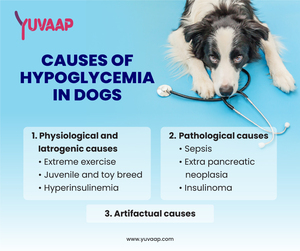More from Yuvaap FindyourY
More in Politics
Related Blogs
Les archives
Partage Social
Hypoglycemia in Dogs: What Every Pet Owner Should Know
Corps
Hypoglycemia dogs is a condition where a dog's blood sugar level drops below normal, leading to various symptoms that can be dangerous if left untreated. As a responsible pet owner, it is essential to understand hypoglycemia in dogs, its symptoms, and what causes it. In this article, we will discuss everything you need to know about hypoglycemia in dogs.
What is Hypoglycemia in Dogs?
Hypoglycemia in dogs is a condition where a dog's blood sugar level drops below normal levels, leading to various symptoms. Blood sugar is the primary source of energy in the body, and when the blood sugar level drops, the body starts using other energy sources like fats and proteins, leading to various symptoms.
Symptoms of Hypoglycemia in Dogs
The symptoms of hypoglycemia in dogs can vary depending on the severity of the condition. Some of the common symptoms include:
- Loss of appetite
- Weakness
- Shivering or trembling
- Disorientation
- Seizures
- Coma
If you notice any of these symptoms, you should take your dog to the veterinarian immediately.
What Causes Hypoglycemia in Dogs?
There are several causes of hypoglycemia in dogs, including:
- Skipping meals: Dogs that do not eat regularly are more likely to develop hypoglycemia.
- Overexertion: Overexertion or excessive exercise can cause a drop in blood sugar levels in dogs.
- Stress: Stressful situations like travelling, being left alone, or loud noises can cause hypoglycemia in dogs.
- Illness: Certain illnesses like liver disease, pancreatic disease, or hormone imbalances can cause hypoglycemia in dogs.
- Insulin overdose: Dogs that are diabetic and receiving insulin injections can develop hypoglycemia if they receive too much insulin.
Treatment for Hypoglycemia in Dogs
If your dog is diagnosed with hypoglycemia, the treatment will depend on the severity of the condition. Mild cases of hypoglycemia can be treated by giving your dog a high-sugar snack like honey, syrup, or a small amount of karo syrup. More severe cases may require hospitalisation, where your dog will receive intravenous fluids and glucose.
Preventing Hypoglycemia in Dogs
Preventing hypoglycemia in dogs involves making sure that your dog eats regularly and has a balanced diet. Avoid overexerting your dog and ensure that your dog is not exposed to stressful situations. If your dog is diabetic and receiving insulin injections, make sure that you follow the veterinarian's instructions carefully and monitor your dog's blood sugar levels regularly.
To learn more about dog health visit Dog health and Wellness
Conclusion
In conclusion, Hypoglycemia in dogs is a serious condition that requires immediate attention. If you notice any symptoms of hypoglycemia in your dog, take them to the veterinarian immediately. Understanding the causes and symptoms of hypoglycemia in dogs can help you take preventive measures and ensure your dog's well-being. By following a balanced diet and avoiding stressful situations, you can help prevent hypoglycemia in your furry friend.
SOURCE: Hypoglycemia Dogs Symptoms













commentaires